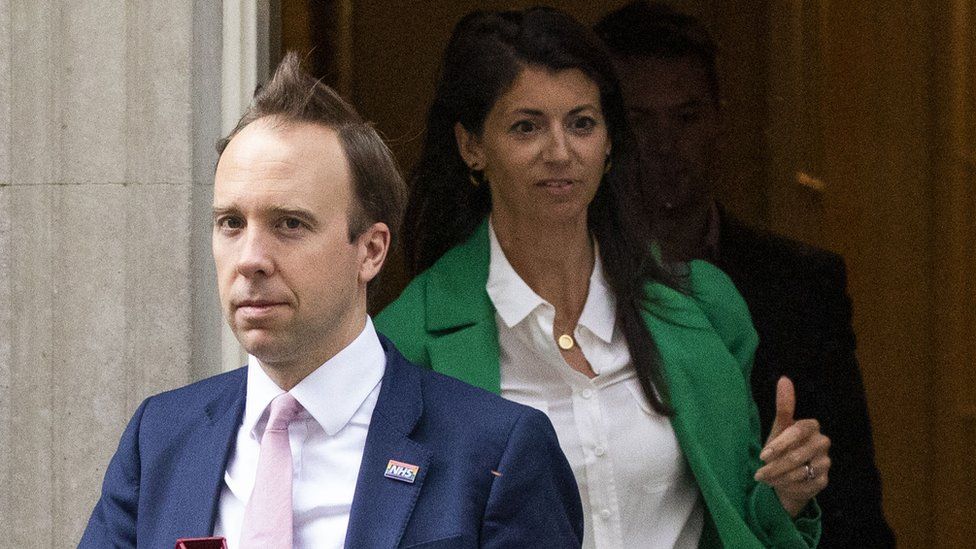PM must sack Matt Hancock after affair claims - Labour
- Published

Labour has called on Boris Johnson to sack Matt Hancock amid reports of an extra-marital affair with a close aide.
It said that if the health secretary had been "secretly having a relationship" with Gina Coladangelo - whom he appointed - this would be a "blatant abuse of power".
But Mr Hancock's colleagues rallied around him, calling allegations of an affair "a personal matter".
The Sun published pictures of Mr Hancock and Ms Coladangelo kissing.
It said these had been taken in the Department of Health offices in May this year.
Mr Hancock cancelled a visit to a Covid vaccination centre at Newmarket Racecourse, in his constituency, on Friday morning, a few hours after the Sun's story was published.
Ms Coladangelo, who has known the health secretary since they were at Oxford University together, was made a non-executive director of the Department of Health last September.
The role comes with a £15,000 salary and involves 15-to-20 days of work per year.
A government spokesman said Ms Coladangelo's appointment had been "made in the usual way" and had "followed correct procedure".
But Labour Party chairwoman Annaliese Dodds said: "If Matt Hancock has been secretly having a relationship with an adviser in his office - whom he personally appointed to a taxpayer-funded role - it is a blatant abuse of power and a clear conflict of interest.
"The charge sheet against Matt Hancock includes wasting taxpayers' money, leaving care homes exposed and now being accused of breaking his own Covid rules.
"His position is hopelessly untenable. Boris Johnson should sack him."
Who is Matt Hancock?
Born in Cheshire in October 1978, he studied at Oxford and Cambridge universities.
He worked for his family software firm and as a Bank of England economist before becoming chief of staff to George Osborne when he was shadow chancellor.
Mr Hancock was elected MP for West Suffolk in 2010, becoming a minister in 2012 and being promoted to culture secretary in January 2018.
He has been health secretary since July 2018 and ran for Conservative leader in 2019, pulling out of the contest after coming sixth in the first MPs' ballot.
Mr Hancock is married with three children and is a keen cricketer and horse rider, having won a race at the Newmarket course, in his constituency, in 2012.
The Liberal Democrats called on Mr Hancock to resign and accused him of "hypocrisy" over social distancing.
Health spokeswoman Munira Wilson said: "He was telling families not to hug loved ones, while doing whatever he liked in the workplace."
Following the publication of the Sun's story, a friend of the Mr Hancock told the BBC he had "no comment on personal matters", adding: "No rules have been broken."
Transport Secretary Shapps also told Sky News that Ms Coladangelo - who is also marketing and communications director at fashion and homeware retailer Oliver Bonas - would have gone through an "incredibly rigorous" process to get her government role.
International Development Secretary Truss told the BBC: "[Mr Hancock] does have my support [in cabinet]. This is a personal matter. I understand that he hasn't broken any of the rules."
Social distancing
Ms Coladangelo, 43, is married to Oliver Bonas founder Oliver Tress and Mr Hancock's wife of 15 years, Martha, is an osteopath.
The government's guidelines for England on hugging friends who are not part of your household states that people can exercise "personal judgement", but should remain cautious.
In May last year, epidemiologist Professor Neil Ferguson resigned from the government's scientific advisory group (SAGE) after it emerged he had broken lockdown rules when a woman he was reportedly in a relationship with visited his home.
Mr Hancock called Prof Ferguson's actions "extraordinary", adding that social distancing rules were "there for everyone" and were "deadly serious".